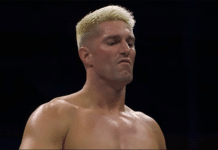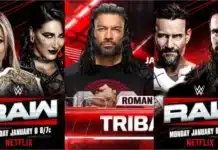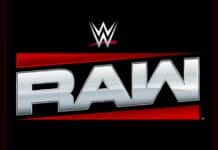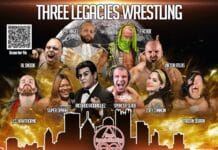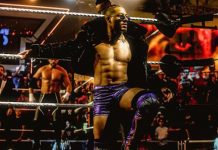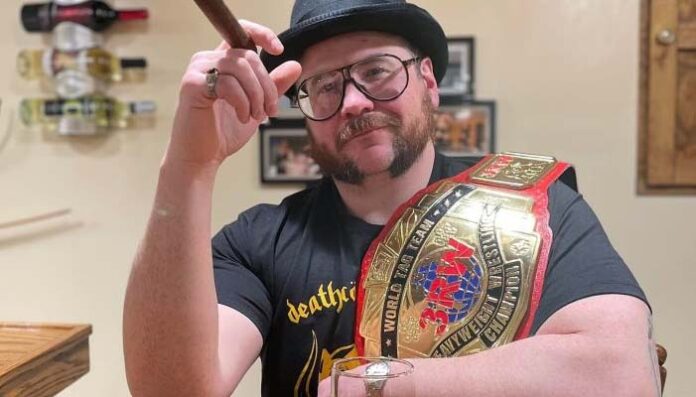
“Just when I thought I was out, they pull me back in” -Micheal Corleone, Godfather III, 1990
Professional wrestling, an entertainment spectacle that was shrouded in secrecy for years, is often compared to the mafia, both for its original code of silence and its often lifetime membership. Originating from the carnival circuit, sports entertainment was usually a cash business at the box office, the same way that La Cosa Nostra dealt with cash in its heyday. There were kingpins that called the plays, very similar to how promoters picked their champions. As we’ve seen more recently, even some of the bosses disappear from public view after indiscretions.
Was kayfabe really that different than omerta?
“I wasn’t aware that there was a whole independent scene for wrestling. The entire thing was mysterious and the idea that I could be a wrestler never even occurred to me because how people broke in was so mysterious”
Glenn Spectre grew up just outside of Philadelphia and was naturally an ECW fan, but first fell for the over-the-top world of professional wrestling when he was a youth that saw the sport on television alongside of his grandfather. However, it wasn’t until a family vacation to the Jersey Shore in the summer of 1987, when he attended a WWF live event that saw his favorite tag team, Demolition squared off against The Bulldogs that the energy of the show left a memorable impression on him.
It wasn’t until he went to college that he saw a peek through the curtain that eventually provided an introduction to learn the ropes of the sport. Working security to make extra cash between classes, Glenn took a gig as security for an independent show promoted in Pittsburgh by local legend, T. Rantula, a mammoth grappler that made appearances for the WWF, WCW, and ECW in the late-90s. Through those shows, Spectre ran into a fellow that claimed to be a trainer, but would soon find out that wasn’t the case. A browse through interviews online will yield stories of even the most well known superstars that were initially swerved when they first broke into the industry. “Teaching someone how to write a check” is a phrase often used to describe such a debacle. Thankfully for Glenn, an established pro of the Pittsburgh scene, the late James Fawcett, known for years as Devil Bhudakahn, swooped in for the save, guiding him toward legitimate training classes.
“Jimmy was my savior in the business because I didn’t know anything about professional wrestling beyond what I saw as a fan. Devil and I met on an outlaw show and he saw something in me, and decided to train me. He rescued me from that bad situation. He helped open the door to a number of local promotions for me. Once we started our tag run at IWC I began working out and training with Shirley Doe and Super Hentai at IWC’s wrestling school. I learned a ton from them as well, and I think they appreciated my dedication to them and the school. A few years later, I became the assistant trainer at the IWC school and I went from training under those guys to working as a trainer at the school which was a huge point of pride for me. I was there multiple times a week and working shows on the weekend. I ate, drank, slept, and breathed pro wrestling,” Glenn explained.
After working outlaw shows throughout 2000 and making a more official debut in 2001, Spectre dove into the sport full-force and made a splash in his home promotion of the International Wrestling Cartel, which was promoted at the time by Norm Connors, the godfather of the Pittsburgh indy circuit, and branched out along the east coast as well. A mixture of solid in-ring technical skills and a level of charisma to connect with a variety of crowds made Spectre one of the talents to watch in the early 2000s. When he wasn’t assisting training classes or studying grainy VHS tapes of international grappling, Glenn zigzagged around Pennsylvania, New York, West Virginia, and Ohio every weekend.
“I got to feud with the late and great Brodie Lee and work with an amazing set of guys, some you’d recognize right away and some are guys who maybe didn’t make it as far, but really were amazing to work with,” Spectre said of his time in NWA Upstate.
“I was a top guy in IWC, getting to work with a number of names and darlings of the indies while also wrestling amazing local Pittsburgh talent. I learned so much in those years, probably the most important thing being, you have to put the work in.I think people often think of professional wrestlers as undisciplined, but I developed a great deal of my work ethic by working tirelessly on the Indies,” he added about his career in Pittsburgh.
Glenn was a natural in the ring with crisp maneuvers and timing, so much so that within just four years into his pro wrestling tenure, he landed a dream opportunity to wrestle in Japan, a place he had seen on those grainy VHS tapes previously mentioned. Makio Kodama, known to his friends as “Macky” owns a wrestling store in Japan and was a big fan of the IWC shows at the time, traveling to see them live when time permitted. Macky saw Shirley Doe, one of the most tenured and respected competitors of Pittsburgh circles, and Glenn compete on a card, which led to promoters in Japan to bring them to the country to wrestle there in a sold out Korakuen Hall, one of the most famous venues in the world. When offered a spot in DDT, a promotion known for its off-the-wall presentation, Glenn was asked to play a flamboyant persona based on Queen front man, Freddie Mercury. Assuming his initial 2004 trip would be a one-off, Glenn and his traveling crew immersed themselves in the Japanese wrestling experience. Eating dinner at the world-famous Ribera Steakhouse, seeing the sights in the country, and finding out their lodging was at a by-the-hour motel made for a memorable trip. What Spectre didn’t know was that he connected so well with the Japanese audience that he would become a semi-regular for the DDT group, with half a dozen tours in nearly a two-year span.
“I loved working in Japan, literally my favorite times in wrestling, and that is saying a lot considering how much fun I have had wrestling. I originally went over to feud with their top babyface Danshoku Dino, who had a similar character, but very quickly we were put together as a tag team as The Gay Machine Guns. Suddenly in subsequent tours, I’m main-eventing televised events in a sold out Korakuen Hall. It was insane how fast it all went from what I thought would be a one match anomaly to something that began to dictate even how I wrestled in the states. My bookings went up tremendously as did what I could ask money wise, but they almost always wanted me to play this character. I absolutely love Japan. It’s the only country I’d want to live in besides the good old USA. I’m super glad Sanshiro Takagi and DDT took a chance on me, and very grateful to have Macky and Doe making the initial connection,” Spectre remarked.
Here is the thing about it Glenn, he wants everything to be better. Himself, the people he works with, and the up and coming talent. I met him when he was ‘retraining’ because he felt that he could do better. He will do whatever he needs to do to improve whatever he is trying to improve. I would mock this doggedness in someone, but the problem is it worked. He got really good, and the places he worked for are better because he was there. The young guys he works with grow with what he shows them,” said J. Worthington Farnsworth, one of the longest-tenured and accomplished commentators of the Pittsburgh scene that was a part of the American crew on the Japanese tour.
But, professional wrestling can be harsh. After the professional highs of trips to Japan, a broken scapula at an NWA Upstate event in 2006 forced Spectre to reevaluate his life. As entertaining as Glenn was in the ring and had the thrills of a lifetime in the process, real-life hit him with a tough reality check. With his family and future in mind, he made the tough choice to hang up his boots, retiring after five very successful years in the sport with brief returns in 2007 and 2008.
“My wife and I were really struggling financially, though she never asked me to quit and has always been my biggest supporter and fan. After I returned from the broken scapula,. I felt this weight in terms of becoming a success. I had been to Japan multiple times, but everything still felt super desperate, and unfortunately I just didn’t see a light at the end of the tunnel. So, I flinched. I hate to admit it, but though I had climbed quite high, I could not see that what I needed to do was just be a bit more patient. I took a break to focus on getting a job and starting a family,” Glenn said.
Glenn joined the real world as a civilian and eventually started his own tabletop game store, Draw Bridge Games, in 2015. He went from headlocks and arm drags to Dungeons and Dragons. Very similar to his stint in wrestling, Spectre found success in the retail world as well, with his store being a very successful and popular spot for games. Glenn’s wife gave birth to a healthy son after he stepped away from the ring, and he launched his own business so he was successful and content in his post-wrestling life. Still, what could’ve happened if Glenn didn’t throw in the towel on pro wrestling?
More recently, things came full circle in many ways, as the man that introduced Glenn to the sport, also played a role in his return to the ring. James Fawcett, the same grappler that originally trained Glenn, passed away in 2007, tragically taking his own life at the age of just 32. Fawcett also trained and mentored Bobby Piskor, known in wrestling circles as Bobby Williams when he wears the stripes or the villainous Robert Parker Williams when he laces up the boots. Bobby, who has a twenty-year career of his own, took over as the IWC head trainer earlier this year. Previously, Piskor paid tribute to his late mentor with a book, which Glenn contributed to, and the proceeds were donated to a suicide prevention organization. Fawcett’s family gifted Bobby his trainer’s wrestling bag, and based on their common ground of a trainer, Bobby presented Glenn with a gift that opened the door for a return to wrestling.
“Bobby had save a set of Jimmy’s gear and framed it for me and he surprised me with in back in 2020. I was super moved. We had been keeping in touch and chatting online and he kept pressing me to at least come back and work out in the ring. I finally agreed and all the longing to get back in the ring that had been completely pent up came pouring out. I went from ‘I’m just going to work out in the ring and get back in wrestling shape to, “I am taking bookings I still have fire and fight, I’m gonna get in the best shape of my life again.; And honestly, it happened fast. I went from being out of the game to being in the ring every week in a very short period of time,” Glenn commented.
“I am so happy to have reconnected with Glenn Spectre during the initial covid lock down. He and I broke into the business together. We have trained these last couple years together to prepare for his in ring return and am thrilled to have him training along side of me,” added Piskor.
Glenn joined Bobby as one of the trainers of the IWC school, just as he had done all those years earlier after he started his journey in the squared circle. Just a few weeks ago, Spectre, now under the “Big Boss” persona, a nod to his veteran status, stepped into an IWC ring to compete against “Big Time” Bill Collier, an impressive athlete that is always on the radar of national success. It might’ve taken 15 years, but talent is talent and more often than not, when someone has something to offer to the sport, there’s always a way that they are brought back to the business.
Just when Glenn Spectre thought he was out, pro wrestling pulled him back in.
For more information about Glenn, you can follow him on Twitter @GlennSpectre
You can check out https://www.drawbridgegames.com
What do you think? Share your thoughts, opinions, feedback, and anything else that was raised on Twitter @PWMania and Facebook.com/PWMania.
Until next week
-Jim LaMotta
E mail [email protected] | You can follow me on Twitter @jimlamotta

